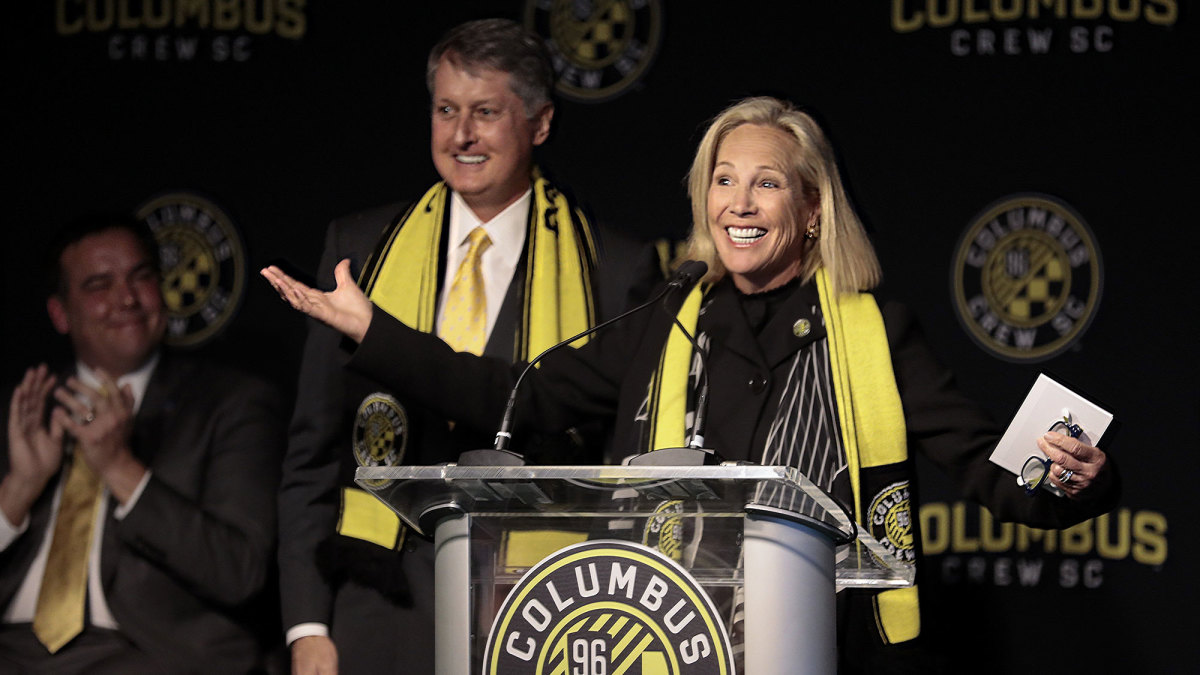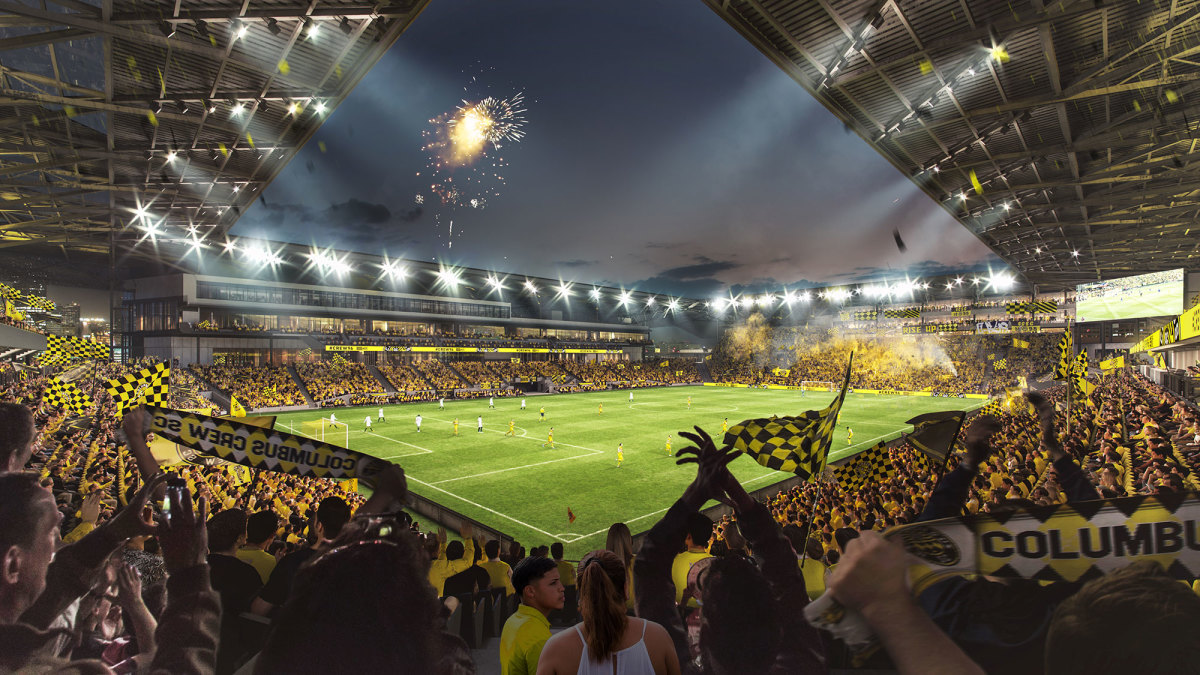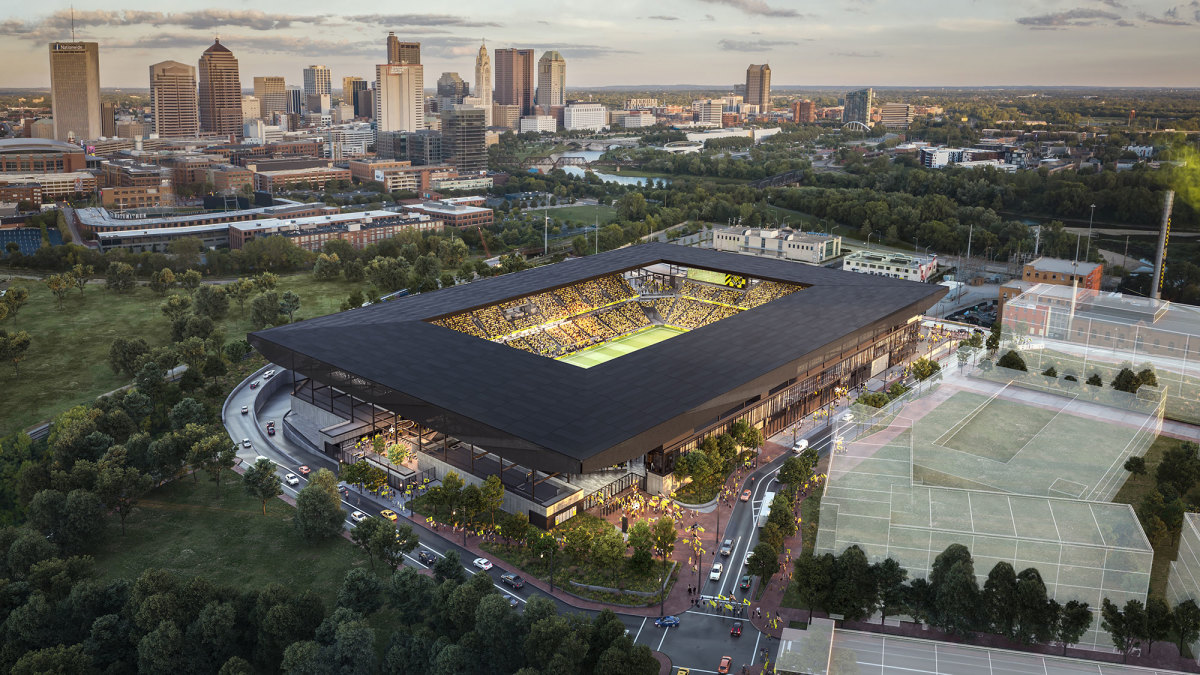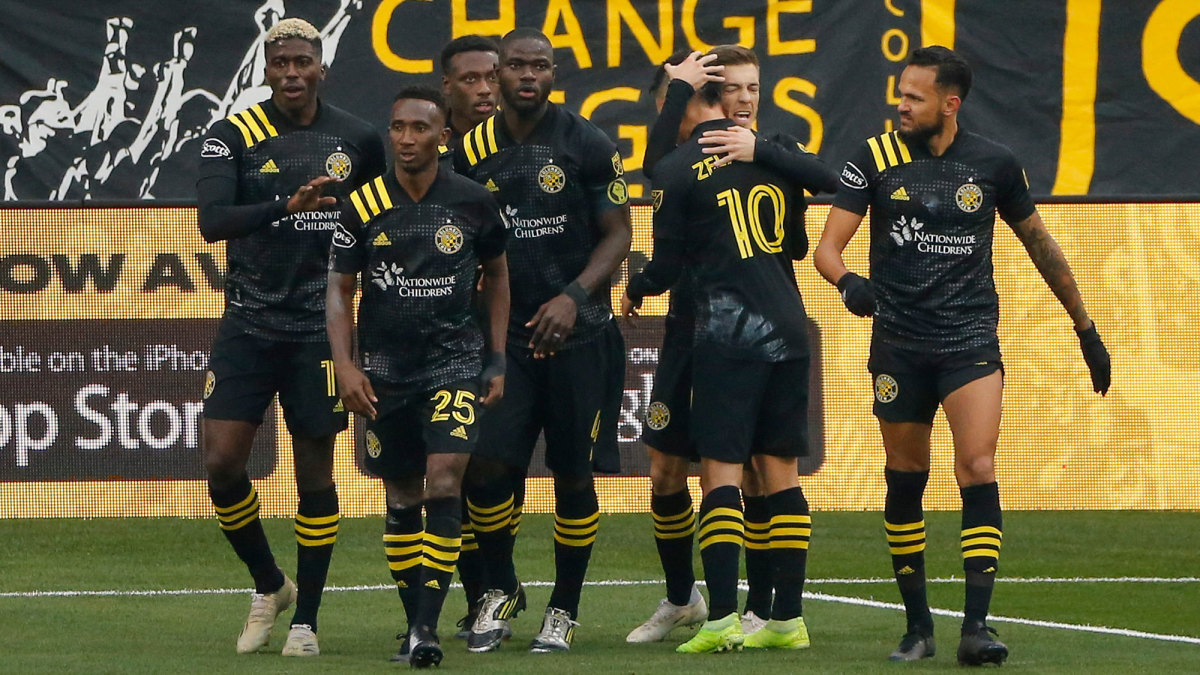Columbus Crew's Revival Culminates With a Chance to Repay City, Fans With MLS Cup
It had already become clear to Dee Haslam that soccer supporters are a different breed, but she still took note of the group gathered outside Mapfre Stadium on one evening over the summer. Two years after Haslam and her husband, Jimmy, purchased controlling interest in the Columbus Crew, their fans were still finding novel ways to make a statement.
“The fans are very different,” she told Sports Illustrated. “We drove up to a match one night and the fans were standing out on the sidewalk [outside the stadium]. They couldn’t go in! But they stood out on the sidewalk. That was as close as they could get. They were there. That, to me, said everything. I was like, ‘They care so deeply.’ And they were there when we left, cheering. Isn’t that just amazing?”
That small but powerful demonstration of commitment to the club brings to mind other times the Columbus soccer community has shown its strength. The Crew exist because of the record 11,000-plus season ticket deposits that stunned MLS organizers in 1994. Suddenly, Columbus was no longer just a college sports town. In 2002, the year after the league’s contraction, the Crew were the only club where average attendance broke 20,000, as fans celebrated a fourth season at MLS’s first soccer-specific stadium. And then there was the rally at City Hall in the fall of 2017, as thousands protested the team’s potential departure. MLS and then-owner Anthony Precourt had engineered a move to Austin. Crew fans responded, organized organically, generated sympathy and support, galvanized the region, attracted new ownership and saved the club.
There’s this old sports banter trope where one fan, when ranting about the penalty kill or defensive line play, uses the word ‘we’ to refer to his/her team. A friend interjects and says, “We? What number do you wear?” or something like that, and everybody has a laugh because in the end fans are just customers and identifying so closely with a pro sports organization is a fantasy.
Except this should not apply to Crew fans. Crew fans, Haslam agreed, can say ‘we.’ Without them, there literally is no team. Without them, there’d be no new stadium set to open next year in the city’s Arena District, and there’d be no MLS Cup final on Saturday evening at Mapfre, where the Crew will entertain the reigning champion Seattle Sounders (8:30 p.m. ET; FOX, TUDN, UniMás).
In three years, the Crew have gone from the brink of oblivion to the brink of a second MLS championship.
“I think you want your fans and your community to feel that feeling of ownership. I think that is absolutely how you want your fans to feel,” said Haslam, who along with her husband also owns the Cleveland Browns. “A team belongs to the community. It absolutely does. We know that about the Browns, and we certainly know that about the Crew. We have always come into this [believing] that we’re keepers of the team for a period of time, and we strive to do a good job. But it really belongs to the fans and the community, and that’s what makes it so great.”

The Haslams are from Tennessee, and apart from a daughter who played, they weren’t soccer people. But their purchase of the Browns, who departed Cleveland controversially in 1996 and returned three years later, taught them a lot about Midwestern sports culture and how much a team can shape a city’s sense of itself.
“Jimmy and I and my son-in-law and daughter were sitting around, they live here in Cleveland not far from us, and we were talking about how horrible it is to lose a team and what it was like for the Browns fans. They still talk about it. And what it would mean to Columbus and Ohio [to lose the Crew],” Haslam recalled. “It’s hard to get these teams. It’s a lot of work and very expensive to be able to get a team to come to your community. So we knew that it would be really tragic to lose the Crew.”
The Haslams knew Columbus Partnership president and CEO Alex Fischer, who connected them with former club doctor Pete Edwards and his family, who are local developers. Discussions with MLS followed, and once Precourt was able to arrange an expansion franchise in Austin, the ownership transfer and public-private stadium partnership soon followed. It was a perfect ending, short of winning on Saturday.
“It would not have worked without every one of those factions being all-in that soccer was important to this community, and we’re committed to helping you and be part of the story. I think this has just shown us how really communities can work together to make something happen,” Haslam said. “A lot of times you don’t really appreciate what you have until you’re threatened with the loss, and so it think that was it.”
It’s certainly a great story for MLS, which can point to the Save The Crew movement as a sign of its growth and relevance, not to mention the power soccer can have in bringing people and stakeholders together.
Speaking this week ahead of the final, MLS commissioner Don Garber said, "This city has embraced this club with the new ownership group, and that's a step—a strong step that got us where we are today. And that support, while it was never absent, was not nearly as energized as it is today.
“When the mayor and Alex Fischer and even the governor stepped in and said, ‘Hey, this team is going to stay here and you, the league, need to figure out a way to achieve that,’ there was an enormous amount of work from people locally and at the league level to try to find a solution that has us where we are today, which is incredibly positive,” Garber continued. “We tend to focus on where we are today. I'm really not focused on what happened and why, because I think that is irrelevant to the success that we hope to be able to build on in the months, weeks and years ahead.”


Choosing not to focus on the past is a convenience that Garber and MLS can now afford because everything worked out. But the league was culpable in the Crew’s near departure, not only because it agreed to insert the Austin out clause into Precourt’s purchase agreement, but because it drew conclusions about the Columbus market without ever seeing what it might accomplish with local ownership (Precourt bought the team from the Hunt family, which also owns FC Dallas, in 2013). Communication with the city, the Columbus Partnership and local business leaders often was inconsistent or unproductive.
It is true that the Crew never turned a profit, and that it ranked toward the bottom of the league in multiple metrics, from commercial and sponsorship revenue to season-ticket commitments and renewals. It is also true that the club never had an owner who was in market permanently and fully engaged. That variable hadn’t been accounted for. The Hunts were juggling multiple teams in multiple leagues, and Precourt, based in California, lacked the Edwards’s local relationships and the Haslams’ billions. Not to mention the fact that he had en eye on Austin from the start.
Not every team in every market needs local ownership. The Crew clearly did.
“I think [MLS] openly talked about that it’s been a struggle, that Anthony had a struggle with it. But I do think there’s a difference when you’re in the community. You’re there. You live there. You’re involved. We don’t live in Columbus, but we’re two hours away, and we’re there and we’re part of Ohio. And the Edwards family is right there,” Haslam said. “So we feel there. We’re involved in what goes on in the community. I’m on the Partnership board. So we’re active. … I think that proximity does help us to dive in.
“Everything’s based on relationships. I think that’s what’s been so helpful,” she added.
Renewed stability and community ties helped bring club president and GM Tim Bezbatchenko, who’d built champions at Toronto FC, along with former Portland Timbers coach Caleb Porter, to the Crew. Bezbatchenko was born and raised in the area, and Porter coached the University of Akron for seven seasons. They, in turn, traded for Cleveland-area product and former Akron star Darlington Nagbe, a serial MLS winner who will miss MLS Cup after testing positive for the coronavirus. But the Crew don’t make Saturday’s final without him. Then last winter, the Crew set a club transfer record with the acquisition of Argentina playmaker Lucas Zelarayán, who was named MLS’s Newcomer of the Year.

“Sponsors have shown interests in partnering with the club, and we're hopeful that season-ticket sales will continue to grow,” Garber said this week. “We are hoping that all the energy that an MLS Cup host position would bring, along with the stadium, which is remarkable, will light up this market that we always believed in and always believed would be a great market for Major League Soccer. So we are optimistic about a bright future.”
That future may be financed by luxury suites and sponsors, but it was hard won by the supporters who stood outside Mapfre this summer and outside City Hall in 2017. If Columbus is the neutral’s sentimental choice on Saturday, it’s because of this. The Sounders are a symbol of how sustained excellence is possible in a parity-driven league. They’re smart, certainly well-supported in their own right and almost always on the leading edge. But the Crew, at least for a while longer, represent something more profound—the desire for fans to feel genuinely indispensable to their club. Save The Crew reminded us that sports teams don’t have to be chess pieces moved around by dispassionate owners. They can be civic institutions, owned as much by the fans who pay for tickets, the sponsors who connect the team and business community, the governments who furnish stadium land and infrastructure and all those who yearn to unite behind something bigger than themselves.
Ideally, an owner can enjoy the Columbus Crew, run the Columbus Crew and profit from the Columbus Crew. But they cannot separate Columbus from the Crew. Those are two words representing one entity.
Haslam said she agrees.
“Since we were raised in one town in family businesses, we are deeply connected to community. That’s just who we are. We’re not all over the place. We’re deeply connected to these communities and we believe in giving back in those communities,” she said.
“When we bought the teams, we knew they were in Columbus and Cleveland. They’re smaller markets. We’re not going to have a lot of the things that bigger markets have,” she acknowledged. “But I have to tell you that I think our fan base though, and our commitment to the team, is so strong in those communities. We can’t think about being anywhere else. This is just us. I don’t know what other owners, how they feel or how they look at it. It is a business, and a really hard business by the way. You have to win on the field and know what you’re doing on the business side off it. Obviously, we have a few challenges. It isn’t easy to win any match. On any given day, anyone can win. That’s what makes it so exciting.”
And so the Crew enter Saturday’s final knowing they’re 90 minutes from a championship, but also that there will be a next season, and a season after that. They’ll be in the mix, not only for the 2020 MLS Cup title but for others to come. Haslam said she and her husband have been so excited, they’ve been walking the floors at night unable to sleep. Fans in Columbus have reason to feel the same.
"It's going to mean everything for this club, for this city, the fan base," Crew captain Jonathan Mensah said this week. "What they've done off the field for this organization is incredible. This is the payback we can also give them in return for their massive and incredible job they've done for us to be able to stay in this city."
Haslam said, “Save The Crew happened, and a tremendous outcome. But I think you now feel that energy—Hey, we’re a championship team! We are here!–It would be awesome to be champions and then open this new stadium.”
